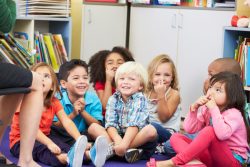
Many of you probably remember the book All I Need to Know I Learned in Kindergarten, which, when I read it, took me back to a time in life when my main jobs were to master tying my shoes and to be nice to my sister even when I lost (again) at Chutes and Ladders.
It turns out that as we get older, we need these skills every day. Our ability to stop and think before we dash off that rash e-mail, ask our children how they are, and really listen to the answer are results of our social and emotional development, or our ability to be the CEO of our brains.
Without this training of our brains toward kindness, organization, and impulse control it would be much, much harder to function in school, at work, or in our families (just think of what would happen if we did send that e-mail).
Our brains receive lots and lots of information every second. Because of executive function – the processes in our brains that direct, connect, and organize information – we can plan our behavior and control our impulses.
More technically, we have self-regulation, working memory, and emotional control. I doubt that many of us remember the exact moment we first patiently waited our turn, but in our play-based early childhood experiences, we learned how to share, how to wait, and how to dress for the weather on the playground. (I don’t know about you, but I still love rain boots.)
What we now know is that the teaching of these executive function skills and a focus on social and emotional development are critical parts of early childhood. This is especially true because our most critical brain growth happens during early childhood. Before age three, eighty-five percent of a child’s core brain structure is formed.
In Arkansas, a broad-based group just completed a complete rewrite of our Child Development and Early Learning Standards. These standards will be the basis for all of our Head Start and ABC classrooms this fall and are publicly available for others to use, too. They have a strong focus on social and emotional learning.
Jackie Govan, Collaboration Director of Arkansas Head Start-State Collaboration Office, says that “social-emotional development and learning in young children correlates with healthy cognitive development and therefore creates a strong foundation for future school achievement and success … ”
By focusing on social and emotional learning in early childhood, we are setting our students up for future success … in school and in life.
